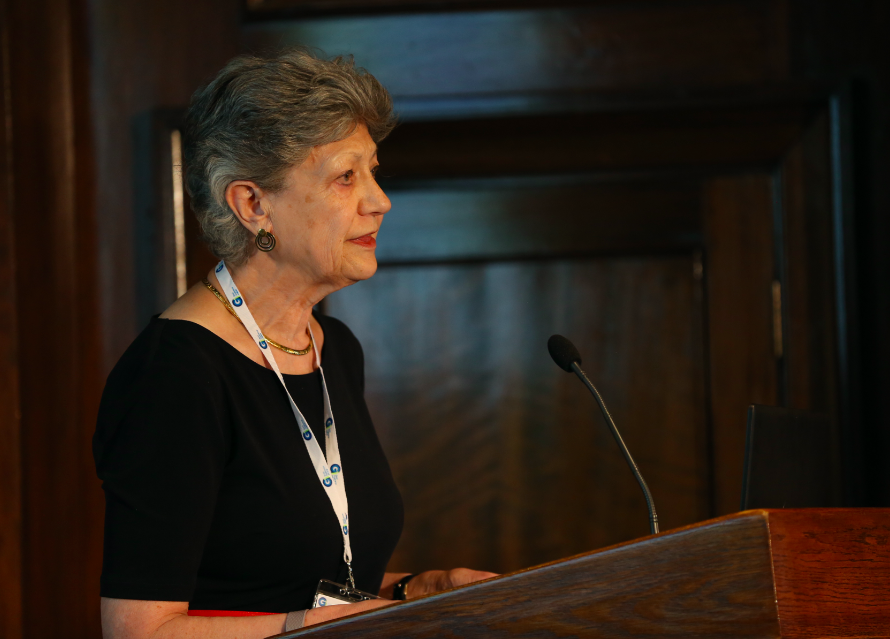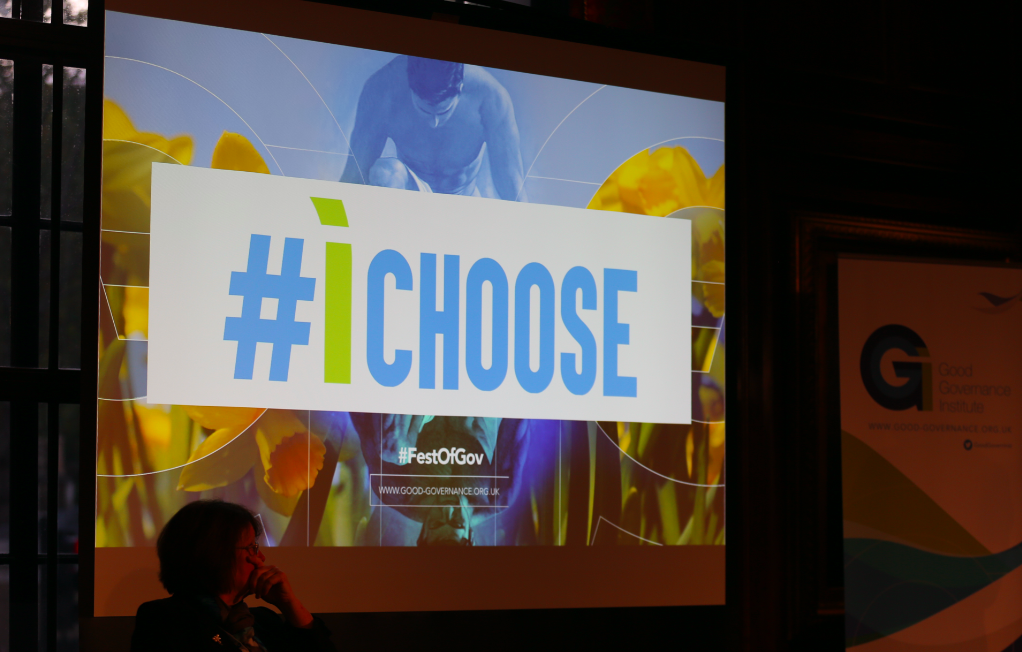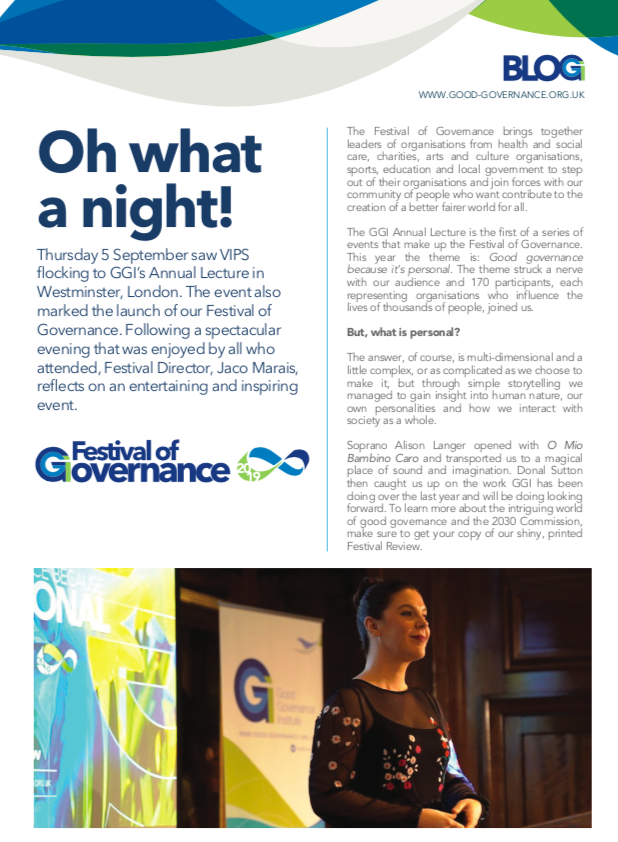Oh what a night!
17 September 2019

Thursday 5 September saw VIPS flocking to GGI’s Annual Lecture in Westminster, London. The event also marked the launch of our Festival of Governance. Following a spectacular evening that was enjoyed by all who attended, Festival Director, Jaco Marais, reflects on an entertaining and inspiring event.
The Festival of Governance brings together leaders of organisations from health and social care, charities, arts and culture organisations, sports, education and local government to step out of their organisations and join forces with our community of people who want contribute to the creation of a better fairer world for all.
The GGI Annual Lecture is the first of a series of events that make up the Festival of Governance. This year the theme is: Good governance because it’s personal. The theme struck a nerve with our audience and 170 participants, each representing organisations who influence the lives of thousands of people, joined us.

But, what is personal?
The answer, of course, is multi-dimensional and a little complex, or as complicated as we choose to make it, but through simple storytelling we managed to gain insight into human nature, our own personalities and how we interact with society as a whole.
Soprano Alison Langer opened with O Mio Bambino Caro and transported us to a magical place of sound and imagination. Donal Sutton then caught us up on the work GGI has been doing over the last year and will be doing looking forward. To learn more about the intriguing world of good governance and the 2030 Commission, make sure to get your copy of our shiny, printed Festival Review.
The scene was set for Andrew Corbett-Nolan’s colourful telling and retelling of the myth of Narcissus and Echo. “It is part of human nature to seek out the best and most beautiful our heart desires.” Despite graphic images of King Ludwig of Bavaria, (the other Narcissus) on the X Factor, Gridnr, Facebook, Twitter and GoFundMe, it was a romantic version of the story of a man, single-handedly, turning his dreams into reality.
But, the story is also depicted through the character of Echo. What we give we get, what we see in others is reflected in us. As we grow up, we assume responsibilities. If we don’t do this, we run the risk of getting stuck in our own development. As our ability to take on responsibilities grows, we grow by making more and stronger connections with the world we inhabit. A failure to be heard is the curse of Narcissis’ Echo who turns to stone.
Interestingly, both Narcissus and King Ludwig of Bavaria came to a lonely end next to the water, weakened by their lack of strong connection with the people around them, subsumed by the nature, beauty and self-gratification, they had adored.
Lord Kamlesh Patel of Bradford then shared with us his journey of choosing to connect with people in organisations that would help him to change the lives of the people he connected with, doing what he loved doing most; social work.

Member of the House of Lords
He said: “To connect with people, we should first be able to put ourselves in their shoes to understand where they are coming from and what exactly their needs and priorities are.”
Our individual and organisational wealth and wellbeing depends on the strength of our connections allowing us to grow into better, more mature individuals with even greater capacity to engage with ourselves and the people we care for.
What is personal; is what we choose to connect to.
Continuing with the medium of storytelling, it is important to note that stories, especially those of the personal nature need to be told in safe spaces, free of shame.

National Data Guardian for Health and Social Care
Dame Fiona Caldicott ensured that we could at least go to the doctor like nobody is watching! It’s right to protect privacy because it helps us to be ourselves within boundaries of trust. To have privacy is to have power over our own narrative; it is where we have the space to be truthful to ourselves. The quality of the data on medical records improves when individuals can be guaranteed that the information is not personally identifiable.
Dame Glenys Thornton presented Dame Fiona Caldicott, England’s National Data Guardian for Health and Social Care, with the annual GGI Governance Prize. We wanted to recognise her for her work on the Caldicott Report and a building legacy of protecting patients’ privacy by ensuring the appointment of a Caldicott Data Guardian in every NHS Trust in the UK.
The presentations culminated with a participatory experience where I suggested that while we can learn from personal and mythological stories, we also have the power to create our own story. You see, when 170 people come together to share stories, we create a culture. In this case, a culture of good governance and personal responsibility.

In his book Sapiens, A brief history of human kind, Yuval Hurari, argues that people cooperating in groups of between 140 and 170 have the power to drive change through storytelling, without shame or the creation of competing factions. Inspired by this concept, we closed the Annual Lecture by launching the hashtag #ichoose over drinks and jazz.
Thank you to everyone who made this a magical evening. Get involved in our Festival of Governance (#FestofGov) by letting us know on Twitter etc., what exactly it is that you would like to change in our culture today, and to use the #ichoose hashtag so that we can track the impact we make.
Or if you have any enquiries, feedback or would like a digital copy of the Festival Review, please email us on events@good-governance.org.uk.

